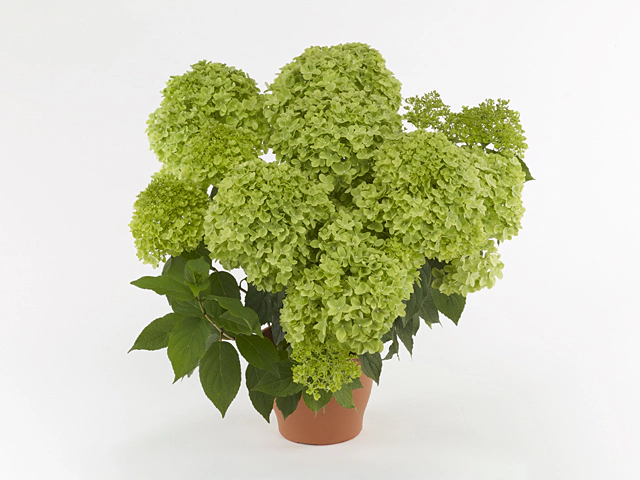Hydrangea paniculata Pansana

| Flower type | Single |
| Leaf margin | Serrate |
| Winter hardness | Excellent (USDA-zone 1,2,3,4) |
| Flower color | Green-light green-145B |
| Leaf, general shape | Elliptic / oval |
| Petal edge | Entire |
| Flower diameter | 3 - 3,5 cm |
| Plant height | 40 - 50 cm; 80 - 90 cm; 90 - 100 cm |
| Inflorescence | Panicle |
| Flowering month(s) | September; October; June; July; August |
| Structure (tissues) | Subshrubby/semi-shrubby |
| Leaf width | 5 - 7,5 cm |
| Leaf duration | Deciduous |
| Leaf size | 7,5 - 10 cm |
| soil pH requirement | Alkaline (pH > 7,5); Neutral (pH 6,5 - 7,5); Slightly acidic (pH 4,5 - 6,5) |
| Light conditions | Sunny; Semi-shades |
| Inflorescence diameter | 15 - 20 cm |
| Leaf, main color | Dark green |
| Flower color distribution | Unicolored |
| Moisture requirements | Well-drained; Moist |
Hydrangea paniculata, commonly known as Pansana, is a beautiful flowering plant that belongs to the hydrangea family. This particular variety of hydrangea has numerous characteristics that make it a popular choice among gardeners and horticulturists.
One of the standout features of Hydrangea paniculata Pansana is its single-type flowers. These flowers have a delicate and elegant appearance, adding a touch of beauty to any garden or landscape. The flower color is predominantly green, with light green hues, specifically classified as 145B on the color chart. The flower diameter ranges from 3 to 3.5 cm, making them of moderate size.
The plant itself has an average height of 40 to 50 cm, 80 to 90 cm, or 90 to 100 cm, depending on the specific cultivar. It has a subshrubby/semi-shrubby structure, and during the winter months, it exhibits excellent hardness, making it suitable for USDA zones 1, 2, 3, and 4. This means that it can withstand cold temperatures and harsh winter conditions.
Hydrangea paniculata Pansana blooms during the months of June, July, August, September, and October, producing panicle inflorescences. These inflorescences have a diameter of 15 to 20 cm, creating a stunning display of flowers.
The leaves of Hydrangea paniculata Pansana are elliptic or oval in shape, with a dark green color. The leaf margins are serrated, adding a unique texture to the foliage. The leaves have a width of 5 to 7.5 cm and a size of 7.5 to 10 cm. This variety of hydrangea is deciduous, meaning that the leaves will shed during winter.
When it comes to the soil pH requirements, Hydrangea paniculata Pansana can tolerate a wide range. It can thrive in alkaline soil (pH > 7.5), neutral soil (pH 6.5 - 7.5), or slightly acidic soil (pH 4.5 - 6.5). This adaptability makes it suitable for various soil conditions.
Regarding light conditions, Hydrangea paniculata Pansana prefers sunny or semi-shaded areas. It can tolerate both direct sunlight and partial shade, making it versatile in terms of placement within a garden.
In terms of moisture requirements, this variety of hydrangea prefers well-drained soil but also appreciates a moist environment. It is crucial to create a balanced watering schedule to ensure the plant receives adequate moisture without becoming waterlogged.
Hydrangea paniculata Pansana is a delightful addition to any garden or landscape. Its single-type flowers, attractive foliage, and adaptability to various growing conditions make it a versatile and visually appealing plant. Whether planted as a standalone specimen, in flower beds, or in containers, this hydrangea variety is sure to capture attention and add a touch of elegance to any outdoor space.
Market availability index by month:
| Jan. | Feb. | Mar. | Apr. | May | Jun. | Jul. | Aug. | Sep. | Oct. | Nov. | Dec. |
|---|---|---|---|---|---|---|---|---|---|---|---|
| 1 | 1 | 1 | 1 | 1 | 3 | 3 | 4 | 2 | 1 | 1 | 1 |